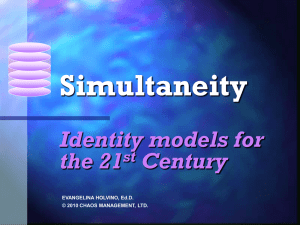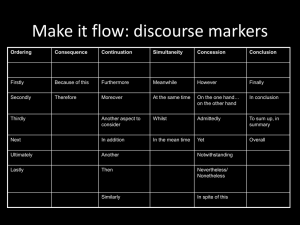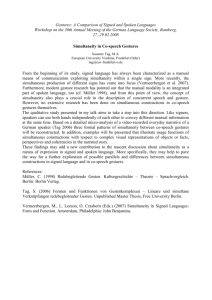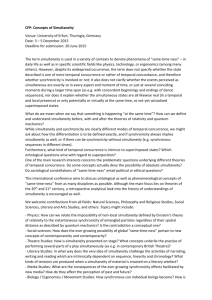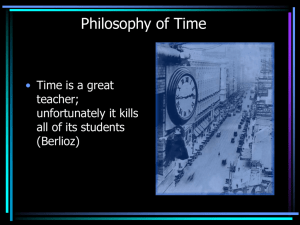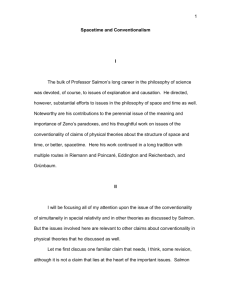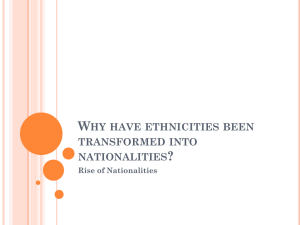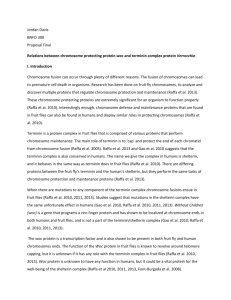Theories of Difference
advertisement
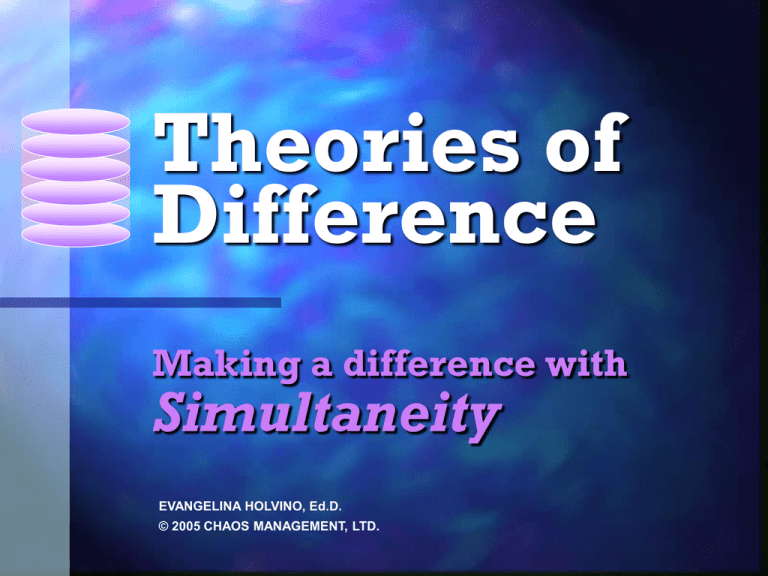
Theories of Difference Making a difference with Simultaneity EVANGELINA HOLVINO, Ed.D. © 2005 CHAOS MANAGEMENT, LTD. What’s In A Name? Complicating Identity From Uncle Tom’s Cabin My name is Other spelling variations, but my family is the only “Holvino” on the Island Evangelina Holvino From the Spanish Moors?! NOT Evangeline Evangelist Eva Angelina Ivonne Evangelino (That would make me male) No, you do not hear the H in Spanish! What’s In A Place? Complicating Identity I am from Puerto Rico No. I’m also from Vermont Why not Puerto Rican? In the USA Lived there For the past 22 years Not from New York Complicated political relation Really! But… where are you from? (But, a P.R. in Vermont?) My accent you mean? Not poor Not uneducated Not the stereotype “Between” Latin America & U.S.A. Dominant Models of Identity TREAT DIFFERENCES AS • • • • Essential Innate Fixed Independent and additive variables The “equality vs. differences” dilemma Example: Dominant Models SOCIAL IDENTITY GROUPS Religion Ethnicity Physical Ability Race Gender Sexual Orientation Age Class 1992: Bailey Jackson, Ed.D.; New Perspectives, Inc.; Amherst, MA. Mental Ability Example: Dominant Models IDENTITY WHEEL Heritage Firm Regional Location Language/ Accent Work Style Age Social Class Gender Race Ethnic Heritage Economic Status Learning Style Education Mental/Physical Abilities & Leadership Characteristics Style Family Status Religion Sexual Orientation Work Experience Communication Style Organizational Role and Level 1996. Marilyn Loden , Implementing Diversity. Irwin Professional Publishing. A Matter of Context “Bature! Bature” After years of identifying myself as “of color” in the United States, to the Nigerian children I was white. An Alternative: Postcolonial Feminist Models TREAT DIFFERENCES AS • • • • • Relational Socially constructed Subjective identity Power relations Interdependent Historically specific and changeable relations Example: Postcolonial Feminist Model INTERSECTIONALITY G R E C 1992: Bell & Nkomo. The Invitation: A Proposal • View identity as multiple, contradictory, situational, relational • Re-conceptualize race, ethnicity, gender, class, nationality, sexuality … … as simultaneous processes of identity, institutional, and social practice The Complexity of Simultaneity THE PROBLEM IS … Theoretical • How to conceptualize identity as simultaneity of: Race Class Gender Nationality Ethnicity Sexuality Practical • How to apply simultaneity in organizational change? Simultaneity Nationality Sexuality Class Gender Ethnicity Race Practical Interventions • Surfacing the hidden stories at the intersection • Identifying and changing differential impact of organizational practices • Linking organizational processes to social (societal) processes A Case Study: Goals of WOCG • Drive change for WOC at X to reach their potential - advancement, retention, development • Support WOC’s professional development • Promote awareness of WOC’s unique challenges • Recognize company as “best” for WOC A Case Study: Activities & Accomplishments • Coaching, feedback, support, advice • Exercising leadership • Meetings with senior management • Bringing visibility to WOC and their issues • Tracking successes, assessing environment, responding strategically A Case Study: The Challenges • Leading and organizing WOCG • Keeping momentum and delivering • Securing committed sponsors • Involving/impacting LOBs and mid-level managers • Communicating accomplishments • Surviving organizational changes A Case Study: Simultaneity Issues? • What is the “value-added” of WOCG? • WOCG potentially divisive? • Have they accomplished enough? • Is dual agenda of driving change and developing WOC appropriate? A Case Study: Recommendations • Re-affirm mission and prioritize goals: • Key events for members • More involvement by senior sponsors • Develop and track indicators of change • “Push” execution of action plans and leadership to regions • Communicate achievements Lessons Learned: Practice of Simultaneity • • • • • • Share quantitative and qualitative data Establish strong links to senior management Celebrate successes; publicize accomplishments Select top performers to lead Work differences among WOC Create flexible, effective internal structures Lessons Learned: Theory of Simultaneity • Different experience and standpoints • Different structural situation • Challenge the discourse of diversity • Embody complexity and simultaneity within and without Challenges of Simultaneity: Concluding Questions • How to influence the field with more complex models? • How to communicate with organizational members? • What would it mean for other groups/you to embrace simultaneity? Thank you DR. EVANGELINA HOLVINO CHAOS MANAGEMENT, LTD. 178 Meetinghouse Lane BRATTLEBORO, VT 05301 802.257.5218 holvino@chaosmanagement.com www.chaosmanagement.com Dr. Holvino is also Affiliate Faculty Center for Gender in Organizations, Simmons College, Boston, Massachusetts www.simmons.edu/som/cgo
